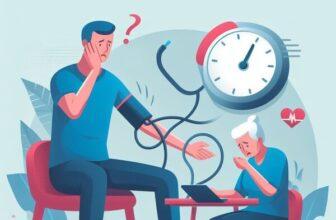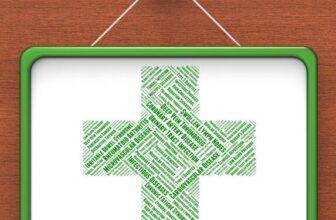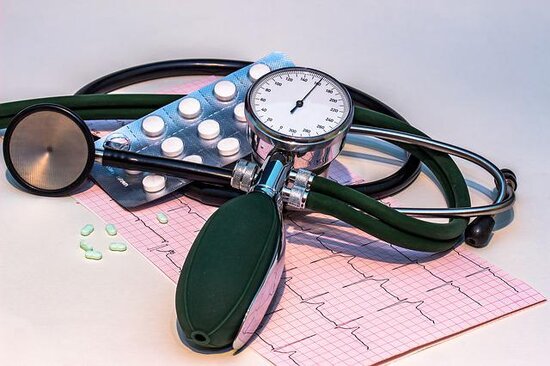
(Note: Some of the links in this post are affiliate links, and we will be compensated when you make a purchase by clicking through our links at no additional cost to you.)
Think about a garden hose with water running through it. Just like too much water pushing through a garden hose can strain the hose, high blood pressure can strain healthy arteries and lead to cardiovascular diseases. This high blood pressure on the arteries is known as hypertension. Sometimes the cause of hypertension is not known.
High blood pressure, or hypertension, is a serious problem for a lot of people. It is especially common in the United States and other western Countries, in people who are 10 or more pounds overweight, and in people 50 and older. However, a plenty of young and otherwise healthy people also suffer from high blood pressure. Because having a high blood pressure increases your risk of heart disease, heart attack, and strokes, it is not to be taken lightly.
What Number Make Your Blood Pressure High?
Basically high blood pressure is when blood pressure checks taken at rest consistently show:
Top number (systolic) blood pressure greater than 140 mm Hg and / or
Bottom number (diastolic) blood pressure greater than 90 mm Hg
- Normal: Less than 120 over 80 mm Hg (120/80)
- Elevated: 120-129 over less than 80 mm Hg
- High blood pressure stage 1: 130-139 over 80-89 mm Hg
- High blood pressure stage 2: higher than 140 over higher than 90 mm Hg (>140/90)
- Hypertensive crisis: higher than 180 over higher than 120 (>180/120)
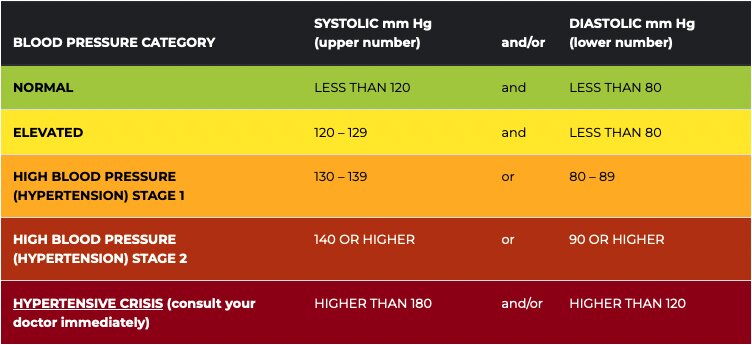
Image Credit: American Heart Association
The only true way of ascertaining whether you have high blood pressure or not is by having it checked or monitored regularly using a home blood pressure monitor and tracking it with a blood pressure log. This is a painless procedure, and every adult should have their blood pressure checked regularly since your blood pressure can change over time. This way you are more likely to catch a change before it becomes dangerous. Ask your health care provider how often you need to check it.
>>> Discover The Most Accurate Blood Pressure Monitor For Home Use
What High Blood Pressure Does To Your Body?
Hypertension or high blood pressure puts a strain on the heart by increasing its need for oxygen making it work harder than normal, over time this also causes the walls of the arteries harden (atherosclerosis). Hypertension is a major health problem, especially because it has no obvious symptoms. Many people have hypertension without showing any obvious symptoms. If you do not know your blood pressure, you should have it checked at your physician’s office or by using a home blood pressure monitor.
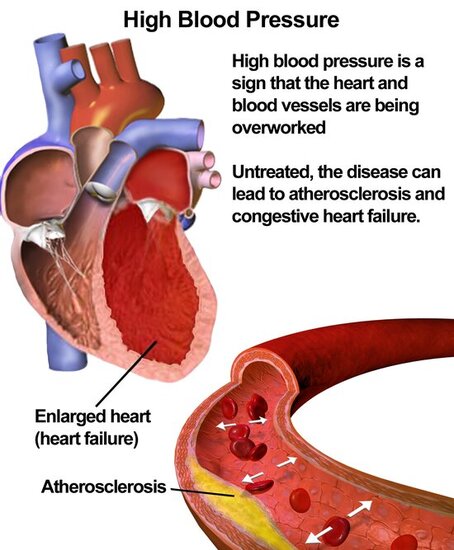
People with high blood pressure often do not feel sick. In fact, hypertension is often called “the silent killer,” because it may cause no symptoms at all for a long time. Your organs and tissues can be damaged by hypertension without you knowing or feeling any ‘external’ symptoms.
If you have hypertension, then you will have a higher risk for heart disease and other medical problems than people with normal blood pressure. Serious complications can be avoided by getting regular blood pressure checks and treating hypertension as soon as it is diagnosed.
What Are The Different Types of Hypertension?
There are two major types of hypertension: essential or primary hypertension and secondary.
Essential (Primary) Hypertension:
Essential hypertension is the most common type, and accounts for more than 95% of all cases. Though this type of high blood pressure tends to “run in the family”, most of the time the cause is not known. It is likely a combination of different factors that could put a person at risk for high blood pressure.
Secondary Hypertension:
Sometimes high blood pressure can be caused by a medical problem such as kidney disease. This type of high blood pressure is called secondary hypertension. Treating the main problem can cause the blood pressure to go down. People with kidney disorders often have secondary hypertension. This is because the kidneys regulate the balance of salt and water in the body. If your kidneys cannot get rid of excess salt and water from the body, your blood pressure goes up. Kidney infections, a narrowing of the arteries that carry blood to the kidneys, and other kidney disorders can disturb the salt and water balance. Kidney problems are by no means the only medical condition that can cause secondary hypertension.
Causes of Essential or Primary Hypertension:
- Family history of high blood pressure
- High alcohol intake
- High sodium intake
- Inactive lifestyle
- Overweight
- Depression and anxiety
- This may have an impact on blood vessels or may lead to unhealthy behaviors such as high alcohol use or poor weight management
- Ethnicity
- High blood pressure is more common among African Americans
Causes of Secondary Hypertension:
- Kidney disorders
- Endocrine disorders such as Cushing’s Syndrome
- Obstructive sleep apnea (episodes during sleep when breathing stops due to obstructive of air passages)
- Stress
- High alcohol intake
- Birth control pills, migraine medicines, some arthritis medicines, and some cold medicines
- Cocaine
- Nicotine
- Heavy coffee drinking (5 or more cups per day), particularly in those who have previously had high blood pressure
How High Blood Pressure Is Dangerous?
You need to call your physician right away for any blood pressure greater than 180 mm Hg systolic and/or more than 120 mm Hg diastolic. A reading this high is referred to “hypertensive crisis.” Blood pressure readings above 180/120 mmHg are considered stroke-level dangerously high blood pressure, and require immediate medical attention.
The most serious type of hypertension is called Malignant hypertension. This is a particularly severe form of high blood pressure where the pressure level is at least 210/120 mm Hg. It occurs in only about 1 of 200 people who have high blood pressure. This type of hypertension is several times more common among blacks than among whites, among men than among women, and among people in poorer economic groups. Malignant hypertension may produce a variety of severe symptoms. If untreated, malignant hypertension usually leads to death in 3 to 6 months.





